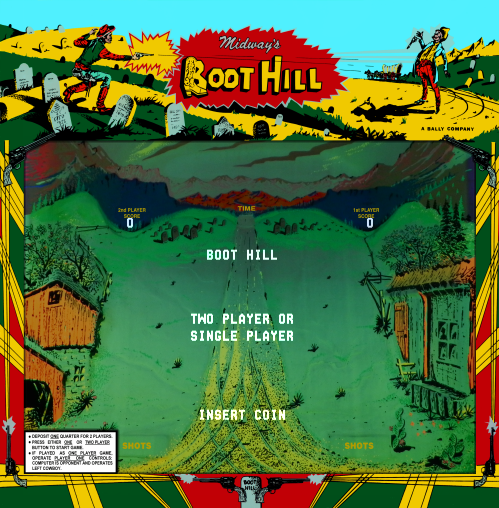 |
| Boot Hill: Even now, I can hear the funeral march. |
However, if you go searching for any kind of link between 'nostalgia' and 'video games' (or any associated words) then 99.99% of the results you find are about retro-gaming.
And that presents a bit of a problem, because my research is centred on general nostalgia, and its application within game design. Yes, most people under 45 will have fond childhood memories where video games will play a strong part. But that has already been done -- to death -- in retro-gaming, and I'm looking for a different angle.
Imagine my surprise when I came across a book addressing the use of non-game nostalgia within game design.
Imagine my even greater surprise when I found that it had a chapter on applied use of nostalgia in game design, using the Battlestar Galactica game (Vivendi / Warthog, 2003) as an example.
Why? Because my course tutor Josh Taylor was senior artist on that game! This appears to be a complete coincidence. (If not, I've been played like a funky piano).
 The book is called "Playing the Past: Hostory & Nostalgia in Video Games" and is edited by Zach Whelan & Laurie Taylor.
The book is called "Playing the Past: Hostory & Nostalgia in Video Games" and is edited by Zach Whelan & Laurie Taylor.The chapter "Remembrance of Things Fast" is an essay written by Anna Reading & Colin Harvey (for a conference in 2005) examining how elements from the old 1970s TV series can conjure a nostalgic aesthetic, narrative and mechanic:
"We would contend that the complex body of relations that constitute gameplay may involve both cultural and experimental nostalgia: thus 'Battlestar Galactica' rearticulates cultural elements from the earlier television series, while invoking a yearning in the player for a lost experience of watching (or perhaps not having watched) the television series" (p.169)
They then go on to analyse the way that the player becomes immersed by the iconography on display, and how this skillfully takes advantage of elements from the contemporary, re-imagined 2003 Battlestar Galactica TV mini-series while following the original 1978 series' mythology instead (i.e. where the Cylon enemy were created by reptilian aliens). This plunges the player into a wave of nostalgia triggers and unleashes a strong affect as the player is torn between the two interpretations. Brilliant stuff.
This essay pretty much sums up where I'm going with my research, and bears a strong similarity to the Literature & Contextual Review that I've just written. It's nice to feel that I'm going in a good direction, and even better to know that I'm not alone on the journey.
